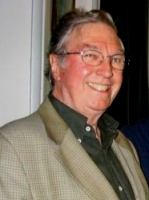
Year Born:
1929
Year Died:
2007
Pioneer
Keatley, Philip (1929-2007)
Philip Keatley was born in Vancouver, B.C. on August 29th 1929. Following graduation from North Vancouver High School and North Shore College, he attended the University of British Columbia, achieving a double major in English and History, which included courses in Theatre history and dramatic practice. While attending UBC, he became actively involved in the Player’s Club and began his lifelong passion for the arts. During the summers he worked as a waiter for the Union Steamship Company. He continued his education at the London Academy of Music & Dramatic Art, studying English acting styles and major theatre movement, and spent a time in what Philip himself referred to as “a fling”, acting in London. His credits included radio drama roles with the BBC, and repertory theatre parts which involved travelling around Britain. Philip returned to Canada and specifically Vancouver, and quickly became immersed in local theatre productions at the newly created Frederic Wood Theatre.
Philip’s career with CBC began in Vancouver when he was offered a position as a production assistant in November, 1956. Three months later he was appointed a producer in the fledgling television studios and, like all new producers at the time, cut his teeth on programs that ran the gamut from News to Sports to Mobiles, Variety and Drama. During those early days, he produced the first Grey Cup broadcast from Vancouver and the drama series Tidewater Tramp.
By the end of the 1950’s, CBC’s newly connected network across Canada and the restrictions imposed on production by the tiny Georgia Street studio were conspiring to bring about the end of TV drama on the West Coast. In response to this inevitability, Philip Keatley, Len Lauk, Frank Goodship and others began to look at the feasibility of doing drama on film. Cariboo Country, produced and directed by Philip, was the first film drama series produced by CBC and shot on location in the areas where the stories were set – in this case up in the Chilcotin plateau west of the Fraser River. Twenty-five scripts were written for the series by Paul St. Pierre over a four-year period and the shows were managed by production assistant Bob Gray (the title “Production Manager” didn’t exist then). The series, which aired from 1959 to 1967, had a special accomplishment – every First Nations’ character was played by an aboriginal person, and there were many such roles in the course of the series. Among them was Chief Dan George, introduced to audiences in the character of “Ol’ Antoine”. The Television Archives’ web page of the Museum of Broadcast Communications stated that, “Cariboo Country, one of the most imaginative, innovative and evocative series ever broadcast by the CBC, was a hybrid of anthology and series programming originating in Vancouver”. Three hour-long specials were subsequently developed from the series – The Education of Phylistine, How to Break a Quarterhorse and Sister Balonika. Education and Quarterhorse were honoured with numerous international awards and a Canadian Film Award.
In 1965 the TV Drama Department – with four full-time Producers, Story Editors, Casting, etc. – was founded in Vancouver with Philip as Executive Producer. Series like Where The Action Was and The Manipulators soon followed. Five years later, development started for The Beachcombers and the series began production in 1971. It ran for an unprecedented nineteen years – the longest running drama series in Canadian television history – and put the town of Gibsons, B.C., which was home to the productions, permanently on the map as a tourist attraction. By 1975 the new CBC studios had opened in Vancouver and the Drama Department was back in business in electronic studio production as well as film. With series and specials such as Leo and Me,which introduced child actor Michael J. Fox, The Magic Lie, and The Overlanders, Vancouver was producing close to 40% of all CBC English-language television drama.
In 1977, Philip transferred to CBC Toronto as Head of Production Training for the English Network. In that capacity, he developed a Drama Directors’ course with BBC Training and later adapted the idea to training for Current Affairs and other areas of production. In addition, he developed training courses in Saint John, Montreal, Windsor, Edmonton and Vancouver. Philip joked that in 1980 he discovered that his entire family had moved home to Vancouver without actually telling him. Very fortunately, CBC agreed to let him join them.
In 1985 Philip became Western Head of Development with the responsibility of creating co-production and independent production in the new relationship between public and private broadcasting and film-making. It was, he said, a great job at an awful time as CBC struggled to come to grips with budget cuts and new media. In 1990 he decided to take an early retirement from the Corporation and embarked on a new venture, starting a private production company with daughter Julia Keatley and producing the series Cold Squad for CTV. That series played for seven seasons; Philip retired for good after three of them.
Philip was a long-standing member of the CBC 20 Year Association and in May, 2007 was elected to the Board of the British Columbia and Yukon CBC Pensioners’ Regional Association.
Philip Keatley passed away on August 6, 2007 following complications arising from respiratory problems.
Written by Peggy Oldfield – August, 2007
